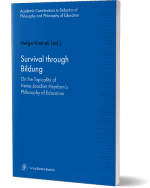We conducted an interview with editor Helge Kminek about his new book “Survival through Bildung. On the Topicality of Heinz-Joachim Heydorn’s Philosophy of Education”. The central reference point of the volume is Heinz-Joachim Heydorn’s essay “Survival Through Bildung – Outline of a prospect” (1974), which was translated into English and subsequently made available to a broad public for the first time.
Interview on “Survival through Bildung. On the Topicality of Heinz-Joachim Heydorn’s Philosophy of Education”
What is behind Survival through Bildung. Could you give us a brief overview of what the publication is about?
The central reference point of the anthology is Heinz-Joachim Heydorn’s essay “Survival Through Bildung – Outline of a Prospect” (1974/2024; original: “Überleben durch Bildung. Umriß einer Aussicht”), which was translated into English and has subsequently been made available to the wider public for the first time.
His essay has been translated and printed here with the generous permission of Mirjam Heydorn. Following this, the collection then offers contributions that examine the text from each author’s perspective and questions Heydorn’s article in terms of its relevance and potential for us today.
Helge Kminek’s asks what we can learn from Heydorn today, especially for the issue of the socio-ecological crisis, for which he uses the concept of the Anthropocene.
Norm Friesen is also drawing a parallel between the threat to humanity in 1974 and today and, for example, on the work of Günther Anders.
Fernando Murillo reads the text from a personalist perspective. His central thesis is that Heydorn’s “survival through Bildung” presupposes an ethics of salvation that involves the whole human person.
Ana Inés Heras draws on the interdisciplinary work of Enrique Pichon-Rivière and José Bleger to examine Heydorn’s contribution and questions of the possibility of comparability between the three theorists and their theories in an internationally comparative way, so to speak.
Finally, Julia Bello-Bravo and Anne Namatsi Lutomia relate their analysis of Heydorn’s contribution to a case study of informal adult education in Africa. They ask, for example, about the potential of digital communication for the learning capacity of network members.
How did the idea for this publication develop?
Over the past few years, I have given a number of lectures on Heydorn’s philosophy of education. I have always been fascinated by the topicality of Heydorn’s arguments. At the same time, I have felt that it is a shortcoming that his perspective is not present in international debates. This is how the idea for this translation came about. Especially because, in my opinion, this text contains Heydorn’s central arguments, but is much shorter than his two main works.
Why are the questions Heydorn asks in his text still relevant? Could you name some examples?
Heydorn’s work deals with the question of a fulfilling, meaningful, good life that is relevant to all people. At the same time, Heydorn answers this question in a way that is unusual compared to other answers. It is therefore recommended reading for everyone. Because of its thematic relevance, the work is likely to be of interest primarily to philosophers of education and educational theorists. In addition, Heydorn links his answer to the question of the good life with anthropological, historical and political analyses and arguments. His contribution should also be of interest to scholars in these disciplines, as well as to anyone concerned with the future of humanity on this planet.
Who would you recommend this publication to?
It will be of particular interest to students and colleagues in education, sustainability studies, philosophy and anthropology. Those with an interest in philosophy outside of academia should also enjoy reading this thought-provoking book.
About Helge Kminek, editor of “Survival through Bildung”

I have been working as a Senior Scientist at the Alpen-Adria-Universität Klagenfurt since 1 April. Previously, I worked as a research assistant and in the meantime as a deputy professor at Goethe University Frankfurt, both as a pre- and post-doc.
Order or download this book in our webshop
On the Topicality of Heinz-Joachim Heydorn’s Philosophy of Education
edited by Helge Kminek
More interview with our authors and editors can be found here.


